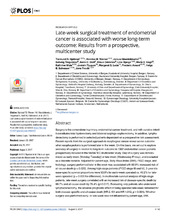| dc.contributor.author | Njølstad, Tormund Salvesen | en_US |
| dc.contributor.author | Werner, Henrica Maria Johanna | en_US |
| dc.contributor.author | Marcickiewicz, Janusz | en_US |
| dc.contributor.author | Tingulstad, Solveig | en_US |
| dc.contributor.author | Staff, Anne Cathrine | en_US |
| dc.contributor.author | Oddenes, Klaus | en_US |
| dc.contributor.author | Bjørge, Line | en_US |
| dc.contributor.author | Engh, Marie Ellström | en_US |
| dc.contributor.author | Woie, Kathrine | en_US |
| dc.contributor.author | Tjugum, Jostein | en_US |
| dc.contributor.author | Lode, Margaret Sævik | en_US |
| dc.contributor.author | Amant, Frédéric | en_US |
| dc.contributor.author | Salvesen, Helga | en_US |
| dc.contributor.author | Trovik, Jone | en_US |
| dc.date.accessioned | 2018-09-04T13:18:24Z | |
| dc.date.available | 2018-09-04T13:18:24Z | |
| dc.date.issued | 2017-08-03 | |
| dc.Published | Njølstad TS, Werner HMJ, Marcickiewicz J, Tingulstad S, Staff AC, Oddenes K, Bjørge L, Engh ME, Woie K, Tjugum J, Lode Ms, Amant F, Salvesen H, Trovik J. Late-week surgical treatment of endometrial cancer is associated with worse long-term outcome: Results from a prospective, multicenter study. PLoS ONE. 2017;12(8):e0182223 | eng |
| dc.identifier.issn | 1932-6203 | |
| dc.identifier.uri | https://hdl.handle.net/1956/18370 | |
| dc.description.abstract | Surgery is the cornerstone in primary endometrial cancer treatment, and with curative intent it constitutes total hysterectomy and bilateral salpingo-oopherectomy. In addition, lymphadenectomy is performed in selected patients dependent on a preoperative risk assessment. Recent reports from the surgical approach to esophageal cancer reveal worse outcome when esophagectomy is performed later in the week. On this basis, we set out to explore weekday of surgery in relation to long-term outcome in 1302 endometrial cancer patients prospectively included in the MoMaTEC multicenter study. Day of surgery was dichotomized as early-week (Monday-Tuesday) or late-week (Wednesday-Friday), and evaluated as a discrete variable. Adjusted for patient age, Body Mass Index (BMI), FIGO stage, and histology, surgery performed later in the week was associated with 50.9% increased risk of all-cause death (p = 0.029). Among high-stage patients (FIGO stage III and IV), 5-year disease-specific survival proportions were 53.0% for early-week operated vs. 40.2% for late-week operated (p = 0.005 for difference). In multivariate survival analysis of high-stage patients, late-week surgery correlated with an increased risk of disease-specific death by 88.7% and all-cause death by 76.4% (p<0.017). Evaluating only patients who underwent lymphadenectomy, the adverse prognostic effect of being operated late-week remained for both disease-specific and all-cause death (HR 2.151 and HR 1.912, p = 0.004). Whether surgery was performed early- or late-week was not influenced by patient age, BMI, preoperative histology risk classification, FIGO stage or postoperative histology (all p>0.05). In conclusion, endometrial cancer surgery conducted late-week is associated with worse long-term outcome. Our findings are most evident among patients with higher FIGO stages, and patients who underwent more extensive surgical procedure (lymphadenectomy). With support from other studies, our results suggest that high-risk patients may benefit from surgery earlier in the week. | en_US |
| dc.language.iso | eng | eng |
| dc.publisher | PLOS | eng |
| dc.rights | Attribution CC BY | eng |
| dc.rights.uri | http://creativecommons.org/licenses/by/4.0 | eng |
| dc.title | Late-week surgical treatment of endometrial cancer is associated with worse long-term outcome: Results from a prospective, multicenter study | en_US |
| dc.type | Peer reviewed | |
| dc.type | Journal article | |
| dc.date.updated | 2018-02-15T12:12:49Z | |
| dc.description.version | publishedVersion | en_US |
| dc.rights.holder | Copyright 2017 The Author(s) | |
| dc.identifier.doi | https://doi.org/10.1371/journal.pone.0182223 | |
| dc.identifier.cristin | 1511040 | |
| dc.source.journal | PLoS ONE | |

